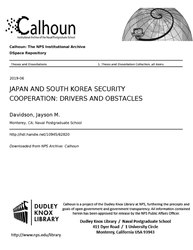File:JAPAN AND SOUTH KOREA SECURITY COOPERATION- DRIVERS AND OBSTACLES (IA japanandsouthkor1094562820).pdf

Original file (1,275 × 1,650 pixels, file size: 2.31 MB, MIME type: application/pdf, 148 pages)
Captions
Captions
Summary[edit]
| JAPAN AND SOUTH KOREA SECURITY COOPERATION: DRIVERS AND OBSTACLES
( |
||
|---|---|---|
| Author |
Davidson, Jayson M. |
|
| Title |
JAPAN AND SOUTH KOREA SECURITY COOPERATION: DRIVERS AND OBSTACLES |
|
| Publisher |
Monterey, CA; Naval Postgraduate School |
|
| Description |
Japan and South Korea’s bilateral security relationship has experienced periods of both cooperation and friction. Despite several contemporary similarities, expanded security cooperation between these two countries remains elusive. Clarifying why Japan and South Korea pursue cooperation at some times but avoid it at others provides a deeper understanding of the relationship between these two East Asian nations. This thesis analyzes the influence of international factors (China, North Korea, and the United States) and evaluates the impact of public opinion and domestic leaders, especially with regard to animosity over historical issues. The research reviews how and when each of the above factors encourages or discourages cooperation, utilizing both qualitative and quantitative methods. In an attempt to capture variation and identify trends in security cooperation levels, the thesis examines Japanese and South Korean defense white papers that catalog security-related meetings, exchanges, and agreements. The thesis confirms that security cooperation levels fluctuate significantly between cooperation and friction, and contends that domestic factors mostly discourage cooperation while international factors have more of an encouraging effect. In fact, domestic factors appear to play a role at least equal to—but potentially more important than—international factors in explaining this fluctuation. Subjects: South Korea; Japan; security cooperation; North Korea; China; United States |
|
| Language | English | |
| Publication date | June 2019 | |
| Current location |
IA Collections: navalpostgraduateschoollibrary; fedlink |
|
| Accession number |
japanandsouthkor1094562820 |
|
| Source | ||
| Permission (Reusing this file) |
This publication is a work of the U.S. Government as defined in Title 17, United States Code, Section 101. Copyright protection is not available for this work in the United States. | |
Licensing[edit]
| Public domainPublic domainfalsefalse |
This work is in the public domain in the United States because it is a work prepared by an officer or employee of the United States Government as part of that person’s official duties under the terms of Title 17, Chapter 1, Section 105 of the US Code.
Note: This only applies to original works of the Federal Government and not to the work of any individual U.S. state, territory, commonwealth, county, municipality, or any other subdivision. This template also does not apply to postage stamp designs published by the United States Postal Service since 1978. (See § 313.6(C)(1) of Compendium of U.S. Copyright Office Practices). It also does not apply to certain US coins; see The US Mint Terms of Use.
|
 | |
| This file has been identified as being free of known restrictions under copyright law, including all related and neighboring rights. | ||
https://creativecommons.org/publicdomain/mark/1.0/PDMCreative Commons Public Domain Mark 1.0falsefalse
File history
Click on a date/time to view the file as it appeared at that time.
| Date/Time | Thumbnail | Dimensions | User | Comment | |
|---|---|---|---|---|---|
| current | 06:23, 22 July 2020 |  | 1,275 × 1,650, 148 pages (2.31 MB) | Fæ (talk | contribs) | FEDLINK - United States Federal Collection japanandsouthkor1094562820 (User talk:Fæ/IA books#Fork8) (batch 1993-2020 #19440) |
You cannot overwrite this file.
File usage on Commons
The following page uses this file:
Metadata
This file contains additional information such as Exif metadata which may have been added by the digital camera, scanner, or software program used to create or digitize it. If the file has been modified from its original state, some details such as the timestamp may not fully reflect those of the original file. The timestamp is only as accurate as the clock in the camera, and it may be completely wrong.
| Short title | JAPAN AND SOUTH KOREA SECURITY COOPERATION: DRIVERS AND OBSTACLES |
|---|---|
| Image title | |
| Author | Davidson, Jayson M. |
| Software used | Davidson, Jayson M. |
| Conversion program | Adobe PDF Library 11.0 |
| Encrypted | no |
| Page size | 612 x 792 pts (letter) |
| Version of PDF format | 1.4 |

